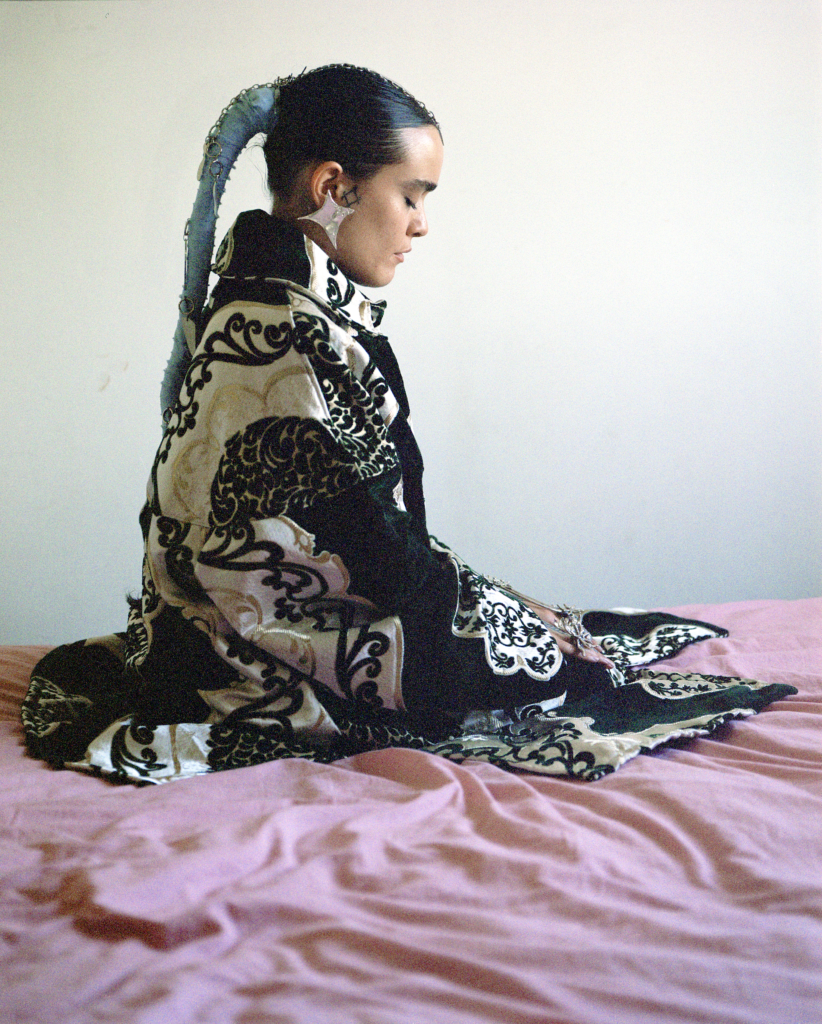NEW ALBUM “HEALING”
[Horizon Musiques / April 2024]
Listening to Flèche Love is to be transfixed and captivated by a voice, a body, and a message that evoke sensations, emotions, and searing images. It is to become one with the music, the sound, the skin.
Amina Cadelli learned baroque music at the conservatory and gets very inspired by her nomad berber origins (by her grand mother). She is the former singer of the famous Swiss pop-electronic band Kadebostany and she weaves musical styles from different continents and eras into a sound that has been all her own from the get-go. As Flèche Love, the multi-talented singer and dancer already has a reputation among modern art pop fans as a highly experimental newcomer happy to snub convention. But only those who have heard tracks like “Umusuna” or “Bruja” and seen the videos really get how this woman opens up new artistic territory – whether musically, dance-wise, visually or just in terms of all-round aesthetics. The Orient and the Occident, North and South America, hip-hop and soul, pop and experimentation are fused into a whole that works so well it feels as if Flèche Love has been fine-tuning it for decades: her debut album “Naga (Part 1)” though only came out in 2019.
With “Naga (Part 2)” released in 2021, the listener is seized by a fierce gentleness, by an artist who is powerfully sensitive and sensitively powerful. Amina is a work of art, a musical sculpture, the encounter of Hemera and Nyx, of day and night, and her music is an amniotic osmosis. Her life has permeated her art. Completely. A hip-hop experience that comes from the soul. Her Berber tattoo on her neck protects her most prized possession, her brass coiled voice forged in adversity.
A modern-day Billie Holiday, Flèche Love is flesh and has a lot of love to give. She draws a sensory path and when she sings, the listener has a physical and spiritual experience. The daughter of Algerian immigrants, who were Berbers, Amina was born and raised in Switzerland. This dual culture, which she received from childhood, eliminated all notions of borders. Even if she grew up in Geneva, Kahina, the fighter and magician, represents for her a trusted protector, and the work of Rumi is a comforting refuge. She is passionate about astrology, ethnology, and science, and, as a child, imagined herself becoming a lawyer, aware at a very young age of the power of words, of their cathartic capacity for freedom. Flèche Love was later invited by the UN, in her native city, to sing and to make her voice resonate at an international conference on women’s rights, in the Human Rights Lounge at the Palais des Nations.
Amina writes, composes, produces, and directs her videos. Few artists possess such a full, coherent, visceral environment. Rachid Taha was not mistaken when, at the sound check of his first Parisian concert, he told her that she was the one he had been looking for for a long time, and shared with her what would be his final duet, “Wahdi”, on his last album, “Je suis africain”.
Flèche Love uses musical syncretism in English and Spanish that leans towards the universal. Her art is already sweeping the world, with concerts in Canada, Korea, and shortly in Greece, Turkey, China, Taiwan, Italy, and Belgium. Not only is she a free singer like Bjork, Sevdaliza, more recently Fka Twigs or the late Lhasa de Sela, but her unique and innovative music is also associated with dance, which she performs as a release with multiple inspirations, mixing Japanese Butō, “expression of the dance of darkness”, oriental dance, krump, etc.
With the second part of Naga that follows volume one released in 2019, she seems to have found satori, a degree of serenity, an inner peace. The seven new tracks, which echo the seven chakras, powerfully blend electronic sounds with strings, tribal percussion, and reverberating choirs. With the broad, majestic and captivating sound of Naga part.2, Flèche Love is transformed into a Fremen goddess conquering Arrakis, a shamanic priestess of the multi-faceted world of tomorrow.
Flèche Love goes straight to the heart, Amina, an Artemisia of the 21st century, caresses our souls with her honesty and determination: expression, testimonial, sharing. Listening to her is like a bubbling river flowing through our veins, it’s a thunderbolt: we are transported, challenged, mesmerized. But as the Zen proverb states, “The Arrow has already hit its target before it leaves the bow, and we are hit straight to the heart.”
in agreement with Horizon Musiques

CLIP – QUANTIC LOVE [APRIL 24]
CLIP – CETUS [FEB 24]
LIVE AT NANCY JAZZ [OCTOBER 2023]
PHILHARMONIC LIVE SESSION FEAT. ORCHESTRA GENEVA CAMERATA [2022]
ACOUSTIC LIVE [2022]
CLIP “MITOTE” [2022]
LIVE AT ZANDARI FESTA [2021]
CLIP “BRUJA” [2020]

